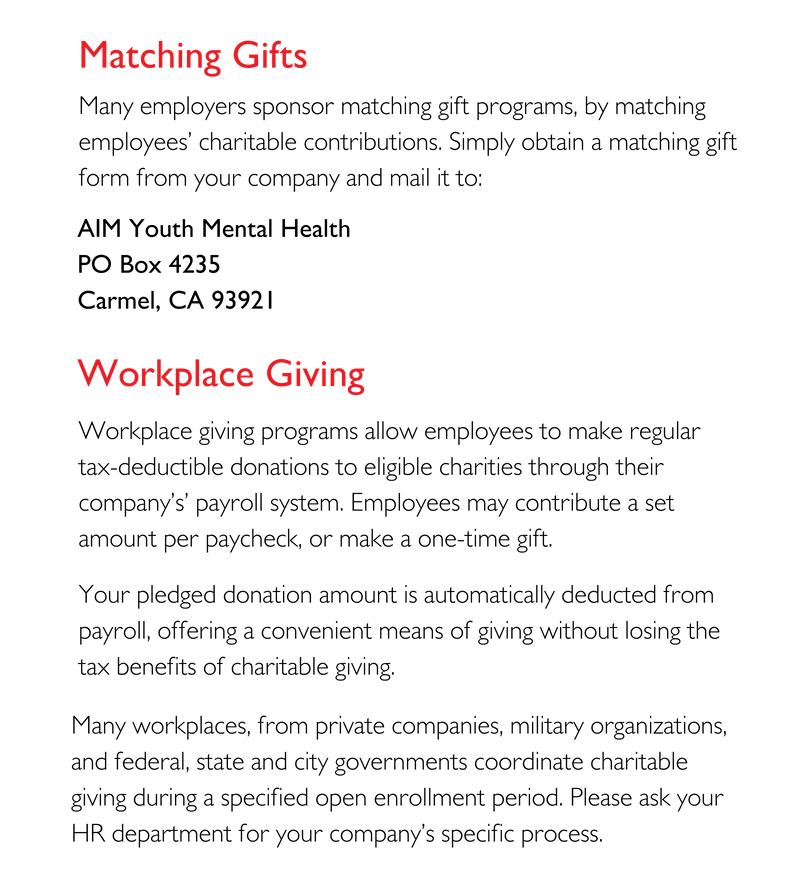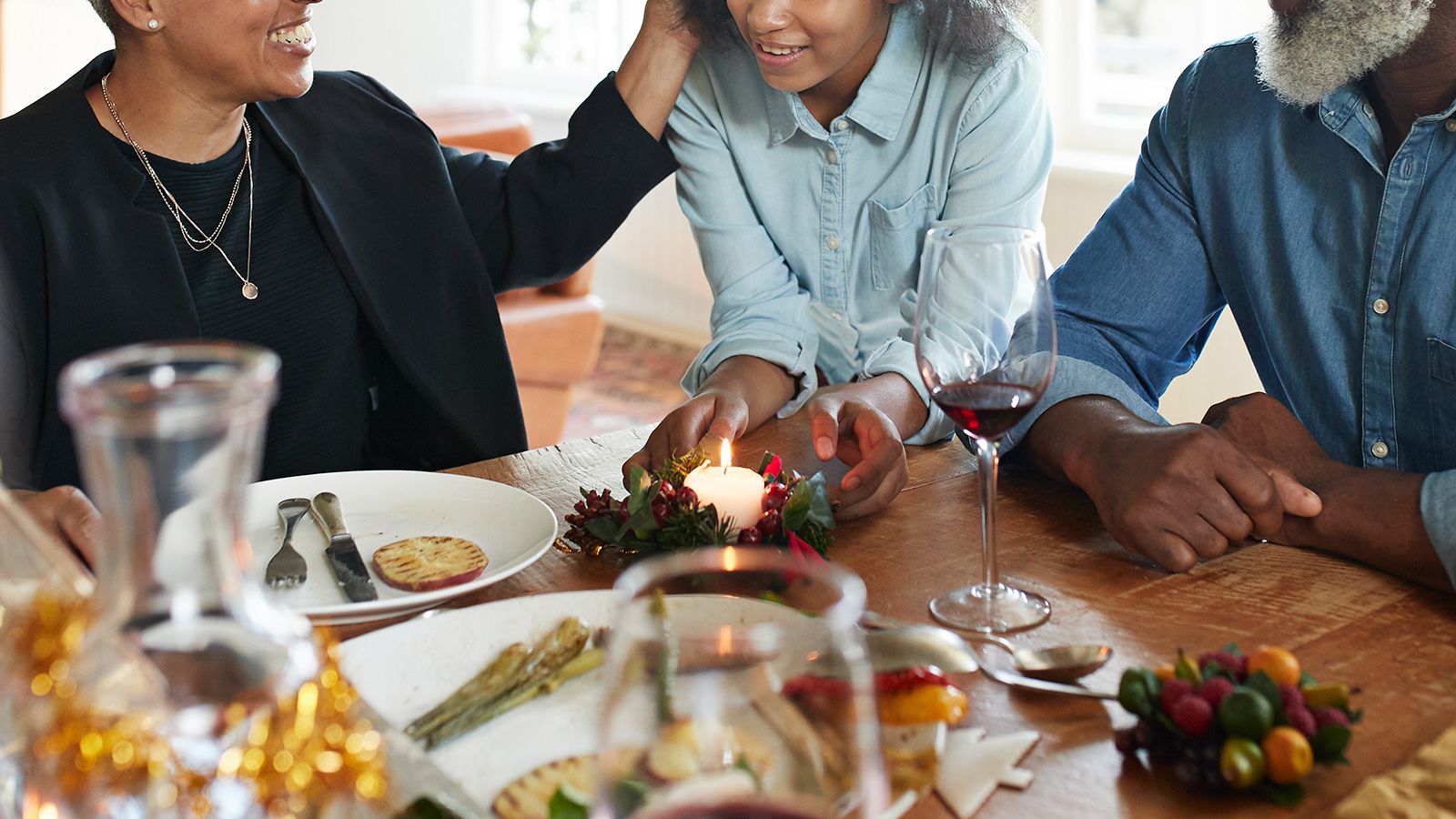
By Katherine Ellison
 The winter holidays are all about the food – the turkey, the ham, the latkes, the pies.
The winter holidays are all about the food – the turkey, the ham, the latkes, the pies.
Families are in closer contact than normal: potentially tough news if your child has an eating disorder.
“The holidays are built around food and joyful gatherings with family and friends to eat food, but those that wrestle with eating disorders look at this time of happiness as another reminder that they are different,” says Seaberry Nachbar, a mother who is working with AIM Youth Mental Health to train and empower families of youth struggling with eating disorders.
“As a parent, it’s incredibly difficult to watch your child suffer through an eating disorder, because one of the most basic roles of a parent is to make sure your child is nourished so her body and mind can grow,” Nachbar adds. “I watched my sweet daughter agonize through endless meals and gatherings, which only become more emphasized during the holiday season.”
“The holidays are so food-centric that they shine a spotlight on any problems that might be happening — and that gives you some unusual opportunities,” says J.D. Ouelette, a family counselor who became an eating-disorders activist after her daughter, Kinsey, developed life-threatening anorexia during the winter of her senior year in high school.
Nachbar agrees, “I could see the battle that was going on in my daughter’s mind about the tradeoffs of eating a holiday meal and how much exercise she would have to do to compensate, or how she was going to deal with the guilt.”
A deadly disorder
Eating disorders affect millions of Americans and kill 10,200 of them every year –one death every 52 minutes — according to the National Association of Anorexia Nervosa and Associated Disorders. They are most prevalent in girls aged 15-24.
Even when not fatal, the two most common eating disorders — anorexia nervosa (self-starving) and bulimia nervosa (bingeing and purging) — can seriously harm adolescents’ cardiovascular, endocrine, and gastrointestinal systems. These disorders were rapidly increasing even before the pandemic dramatically elevated youth mental health disorders.
Heading into this year’s holidays, AIM Youth Mental Health is offering a day-long interactive workshop — “Be Body Positive” — to educate and empower parents, educators, first-responders, and other caring adults to support children, teens, and young adults with body image and eating issues.
Saturday, December 3, 2022 | 9AM – 4PM
Carmel High School Performing Arts Center
27990 N Doris Watson Pl, Carmel-By-The-Sea
Space is Limited to 50 Participants | Register Here

“I always tell parents, you have to learn to trust your spidey-sense,” says Ouelette, referring to Spiderman’s instinctive awareness of things going wrong. She counsels families today as director of Lived Experience for Equip Health, an online eating disorders treatment program. “If your gut is telling you there’s a problem, lean in,” she says. “Don’t lean away.”
Learn the warning signs
Kinsey’s eating disorder was well underway during the winter holidays in 2011, but Ouelette says she didn’t yet know how to recognize it. The previous November, Kinsey and her friends had decided to join in a “healthy makeover” before they went to college. Yet by early December, Kinsey was complaining that her stomach hurt when she ate gluten or dairy. Ouelette took her to doctors who did lab tests and even prescribed medication for gastroesophageal reflux disease (GERD).
Kinsey’s personality also seemed to be changing. She skipped meals with the family, ate less and less, and began to isolate from her friends. It was only in January 2012, after an odd scene at pizza parlor on a family trip to visit a college in Flagstaff, that Ouelette and her husband put two and two together. “Kinsey was shouting at me, causing a huge scene so people were staring,” Ouelette remembers. “She shouted, ‘What kind of mother takes her daughter to a pizza parlor?’”
On their return home, Kinsey’s pediatrician confirmed that she was suffering from anorexia. “We caught it faster than a lot of parents,” Ouelette says. Still, today she is much better versed in the warning signs of eating disorders.
“If they’re picking a fight so they don’t have to go to grandma’s house for dinner, or at every meal they’re getting up to go to the bathroom, if they’re starting to avoid their friends, or eating different foods or even changing the way they exercise, these are all things to watch out for,” she says.
Neurobiological roots
Kinsey was treated at a partial hospitalization program where a team including a psychiatrist, nurse, therapist, and dietician helped her recover. The founder and director of the center, Walter Kaye, is a member of AIM’s Scientific Advisory Board.
Kaye, whom we interviewed in 2021, believes that individual neurobiology plays a much stronger role in eating disorders than family dynamics – the most common explanation in years past.
Kaye and fellow researchers have found evidence of these differences as they have studied the brains of people with anorexia. In one study, they reported that the reward centers in the brains of people with anorexia don’t activate in response to food as they do in people without the disorder, making it harder for them to respond appropriately to hunger.
Kaye’s research also offers some hopeful news for families, suggesting, for instance, that daytime programs can help adolescents recover from food disorders without having to be hospitalized.
Another comforting finding for parents comes from Dr. James Lock at Stanford, whose research on family-centered approaches to care has been funded by AIM. Though Lock recalls a time when clinicians assumed eating disorders were the fault of faulty parenting —thinking that over-controlling, domineering parenting was a key factor in the disease—more and more researchers and practitioners recognize that parents are far from being the problem. Instead, parents are an essential part of successful treatment and an important asset in their child’s healing process.
Ouelette is happy to report that Kinsey, now 28, has normalized her relationship with food – and was expecting her first baby in November. Yet she looks back on helping Kinsey throughout her months of illness as “the hardest thing I ever did in my life.”
She learned a lot over that time, she says, recalling a particular day with her daughter at the clinic.
“Kinsey had very high caloric needs as she was trying to gain back her weight, and I remember one afternoon when a dietician was reviewing her chart and told me, ‘You’re going to need to bump up her calories,’” Ouelette says. “I said, ‘You’re going to be the one to tell her that,’ and the dietician said, ‘I can, but it should be you. I’m in your life for a very short time. If you give me your authority, you are giving it away.”
Today, Ouelette says: “I one-hundred percent tell parents, ‘You are the captain of this team.’ You really need to own that and tell your child ‘I’m the person in charge of your health.’“
To help families struggling with eating disorders, Nachbar is working with AIM Youth Mental Health to develop a series of workshops designed to empower parents, family members, friends and loved ones as advocates. “We want to provide practical tools and positive inspiration that can break the spiral of shame and guilt associated with eating disorders. The Be Body Positive training does just that,” she adds.
Join us on Saturday, December 3rd at Carmel High School Performing Arts Center from 9 am to 4 pm for the Be Body Positive training. The day-long interactive workshop will explore how the 5 competencies of the Be Body Positive model can promote a more joyful and peaceful relationship with your own body so you can help the children and teens in your life experience the same. Rather than dictating a restrictive or prescriptive set of rules to follow, the Be Body Positive training provides practical tools, inspiration, and support to empower participants to find their own way to improved health and greater happiness.
Some common warning signs of an eating disorder
- Sudden weight loss or gain
- Changes in eating patterns, such as habitually skipping breakfast or lunch
- Keeping track of everything they eat in a day
- Sudden decision to go vegan or vegetarian
- Exercise compulsion
- Food rituals (like excessive chewing or not letting foods touch each other)
- Girls experience menstrual irregularity or stoppage
- Boys focused on bodybuilding
- Dizziness or fainting
- Stomach cramps or acid reflux
- Cuts and calluses across the top of the finger joints (from inducing vomiting)
You can find treatment, resources, and support from:
The Eating Disorders Resource Center
National Eating Disorders Association
Monterey County: Montage Health – Ohana Center for Child and Adolescent Behavioral Health
______________________
About the Author
Katherine Ellison is a Pulitzer Prize winning journalist and the best-selling author. Some of her books include Buzz: A Year of Paying Attention, The Mommy Brain, AHDH: What Everyone Needs to Know, Loving Learning, and more.



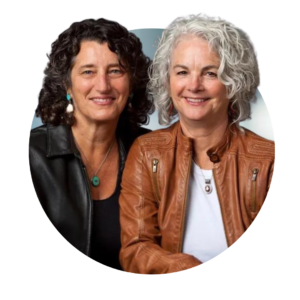
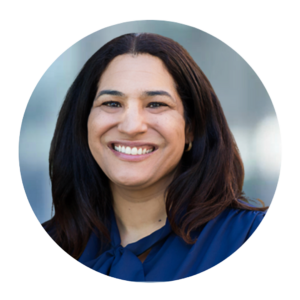








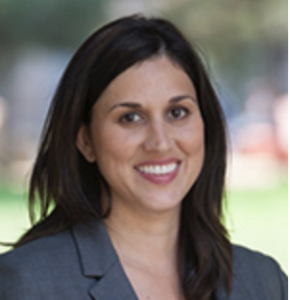




 Moving Upstream: A Proactive Approach to Addressing Behaviors and Bullying
Moving Upstream: A Proactive Approach to Addressing Behaviors and Bullying Krista Reuther is the Assistant Director of Ohana’s Community Health and Prevention Program. She received her Masters in Public Health and Social Work at UC Berkeley. She comes to this position after 14 years of clinical social work experience at Stanford Children’s Hospital in pediatric oncology, critical care, and bereavement. Her goal is to reduce the incidence of mental illness in children and adolescents in Monterey County.
Krista Reuther is the Assistant Director of Ohana’s Community Health and Prevention Program. She received her Masters in Public Health and Social Work at UC Berkeley. She comes to this position after 14 years of clinical social work experience at Stanford Children’s Hospital in pediatric oncology, critical care, and bereavement. Her goal is to reduce the incidence of mental illness in children and adolescents in Monterey County. Dr. Guss is a 35-year veteran educator with a doctorate degree in Educational Leadership. She served as a classroom teacher for 10 years, including two years as a teacher in a bilingual program in South Central Los Angeles. She has also served as a college professor, mentor teacher for new teachers, and a master teacher for teacher candidates completing their student teaching experience. She continues to be a strong advocate for the teaching profession.
Dr. Guss is a 35-year veteran educator with a doctorate degree in Educational Leadership. She served as a classroom teacher for 10 years, including two years as a teacher in a bilingual program in South Central Los Angeles. She has also served as a college professor, mentor teacher for new teachers, and a master teacher for teacher candidates completing their student teaching experience. She continues to be a strong advocate for the teaching profession. Fellowship: Stanford University School of Medicine (1994) CA
Fellowship: Stanford University School of Medicine (1994) CA Michael G. Thompson, Ph.D. is a consultant, author and psychologist specializing in children and families. He is the supervising psychologist for the Belmont Hill School and has worked in more than seven hundred schools across the United States, as well as in international schools in Central America, Europe, Africa and Asia.
Michael G. Thompson, Ph.D. is a consultant, author and psychologist specializing in children and families. He is the supervising psychologist for the Belmont Hill School and has worked in more than seven hundred schools across the United States, as well as in international schools in Central America, Europe, Africa and Asia.
 is 15 years old and a sophomore at Marina High School in Marina, CA. Her academic interests include math, history, and psychology. She joined the AIM Ideas Lab in 2021 because she wanted to be a part of something that could have a great impact on her community. Marwa is interested in youth mental health because she has always been fascinated with the human mind and she wants to support those that are suffering who may feel like their challenges in life aren’t important enough or are too afraid to seek necessary help.
is 15 years old and a sophomore at Marina High School in Marina, CA. Her academic interests include math, history, and psychology. She joined the AIM Ideas Lab in 2021 because she wanted to be a part of something that could have a great impact on her community. Marwa is interested in youth mental health because she has always been fascinated with the human mind and she wants to support those that are suffering who may feel like their challenges in life aren’t important enough or are too afraid to seek necessary help. Giovanna Panetta is a 16 year old junior at Carmel High School. She has always been called to STEM subjects, specifically biology. The AIM Ideas Lab instantly attracted her attention as a research opportunity. Gia has always comprehended the importance of mental health. She knows that COVID only exacerbated previously existing problems, and that as a community we can try and find the root of those problems. Mental health is an integral part of life, and can impede a body’s ability to be healthy. She strongly believes that life is worth living, and she wants to help anyone that thinks otherwise.
Giovanna Panetta is a 16 year old junior at Carmel High School. She has always been called to STEM subjects, specifically biology. The AIM Ideas Lab instantly attracted her attention as a research opportunity. Gia has always comprehended the importance of mental health. She knows that COVID only exacerbated previously existing problems, and that as a community we can try and find the root of those problems. Mental health is an integral part of life, and can impede a body’s ability to be healthy. She strongly believes that life is worth living, and she wants to help anyone that thinks otherwise. Dr. Friedman completed her undergraduate degree in Psychology from University of California San Diego (UCSD). She went on to complete her masters and doctorate degrees (Ph.D.) in Clinical Psychology from Rosalind Franklin University of Medicine and Science/Chicago Medical School. Dr. Friedman completed her pre-doctoral internship at Rush University Medical Center, Chicago, IL, and her post-doctoral fellowship training at the VA San Diego Healthcare System. Her clinical training and experience has been focused primarily on comprehensive assessment and effective treatments for anxiety, mood and related disorders. Dr. Friedman has extensive experience in providing Cognitive Behavioral Therapies for anxiety disorders (e.g. worry, OCD, social anxiety, phobias and PTSD), depression, adjustment disorders/life stress, insomnia and body-focused repetitive behaviors (e.g. Trichotillomania and skin picking). She has received training in evidence-based interventions for a variety of specific problems, including exposure with response prevention (ERP) for treatment of OCD, Prolonged Exposure (PE) for treatment of PTSD, and Cognitive Behavioral Therapy for Insomnia (CBT-I). Moreover, she has specialty training in the treatment of childhood anxiety and related disorders, such as ADHD, selective mutism, separation anxiety, PTSD, depression and specific phobias. In addition, Dr. Friedman has developed an expertise in research on Trichotillomania and body-focused repetitive behaviors, which has led to numerous local and national presentations. Dr. Friedman regularly attends local and national conferences, training seminars and workshops in order to stay informed on the most up to date treatments and apply state of the art science into her clinical practice.
Dr. Friedman completed her undergraduate degree in Psychology from University of California San Diego (UCSD). She went on to complete her masters and doctorate degrees (Ph.D.) in Clinical Psychology from Rosalind Franklin University of Medicine and Science/Chicago Medical School. Dr. Friedman completed her pre-doctoral internship at Rush University Medical Center, Chicago, IL, and her post-doctoral fellowship training at the VA San Diego Healthcare System. Her clinical training and experience has been focused primarily on comprehensive assessment and effective treatments for anxiety, mood and related disorders. Dr. Friedman has extensive experience in providing Cognitive Behavioral Therapies for anxiety disorders (e.g. worry, OCD, social anxiety, phobias and PTSD), depression, adjustment disorders/life stress, insomnia and body-focused repetitive behaviors (e.g. Trichotillomania and skin picking). She has received training in evidence-based interventions for a variety of specific problems, including exposure with response prevention (ERP) for treatment of OCD, Prolonged Exposure (PE) for treatment of PTSD, and Cognitive Behavioral Therapy for Insomnia (CBT-I). Moreover, she has specialty training in the treatment of childhood anxiety and related disorders, such as ADHD, selective mutism, separation anxiety, PTSD, depression and specific phobias. In addition, Dr. Friedman has developed an expertise in research on Trichotillomania and body-focused repetitive behaviors, which has led to numerous local and national presentations. Dr. Friedman regularly attends local and national conferences, training seminars and workshops in order to stay informed on the most up to date treatments and apply state of the art science into her clinical practice. Dr. Piacentini is a board-certified clinical child and adolescent psychologist and Professor in the UCLA Department of Psychiatry and Biobehavioral Sciences. He directs the UCLA Child OCD, Anxiety, and Tic Disorders Clinic and Tourette Association Center of Excellence which provide diagnostic evaluation and treatment (both therapy and medication) for youth with the above problems. He also directs the UCLA Center for Child Anxiety Resilence, Education, and Support (CARES; carescenter.ucla.edu) which provides education and programming to parents, teachers, and clinicians about anxiety prevention and management.
Dr. Piacentini is a board-certified clinical child and adolescent psychologist and Professor in the UCLA Department of Psychiatry and Biobehavioral Sciences. He directs the UCLA Child OCD, Anxiety, and Tic Disorders Clinic and Tourette Association Center of Excellence which provide diagnostic evaluation and treatment (both therapy and medication) for youth with the above problems. He also directs the UCLA Center for Child Anxiety Resilence, Education, and Support (CARES; carescenter.ucla.edu) which provides education and programming to parents, teachers, and clinicians about anxiety prevention and management. Citlalli Nava is 18 years old and a first year majoring in Psychology at Hartnell Community College in Salinas, CA. She is passionate about understanding how mental health affects how youth think, act, and feel. Citlalli joined the AIM Ideas Lab in 2021 after witnessing the increase in mental health challenges in teenagers and considering the mental health issues they are facing. Citlalli is interested in youth mental health because it is a real problem faced by her generation.
Citlalli Nava is 18 years old and a first year majoring in Psychology at Hartnell Community College in Salinas, CA. She is passionate about understanding how mental health affects how youth think, act, and feel. Citlalli joined the AIM Ideas Lab in 2021 after witnessing the increase in mental health challenges in teenagers and considering the mental health issues they are facing. Citlalli is interested in youth mental health because it is a real problem faced by her generation. Clinical and community psychologist and health care innovator Arthur C. Evans Jr., PhD, is CEO of the American Psychological Association, the leading scientific and professional organization representing psychology in the United States. With more than 146,000 researchers, educators, clinicians, consultants, and students as members, APA promotes and disseminates psychological knowledge to benefit society and improve lives – a mission consistent with Evans’ life work.
Clinical and community psychologist and health care innovator Arthur C. Evans Jr., PhD, is CEO of the American Psychological Association, the leading scientific and professional organization representing psychology in the United States. With more than 146,000 researchers, educators, clinicians, consultants, and students as members, APA promotes and disseminates psychological knowledge to benefit society and improve lives – a mission consistent with Evans’ life work.

